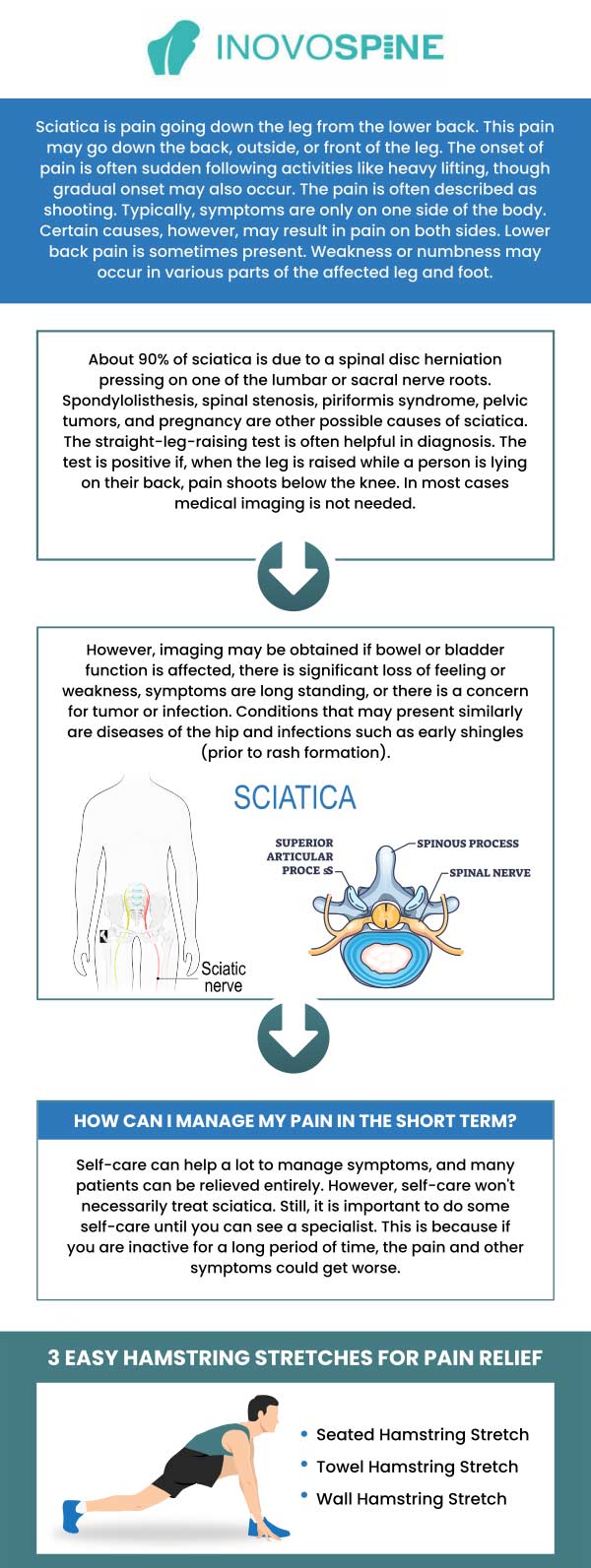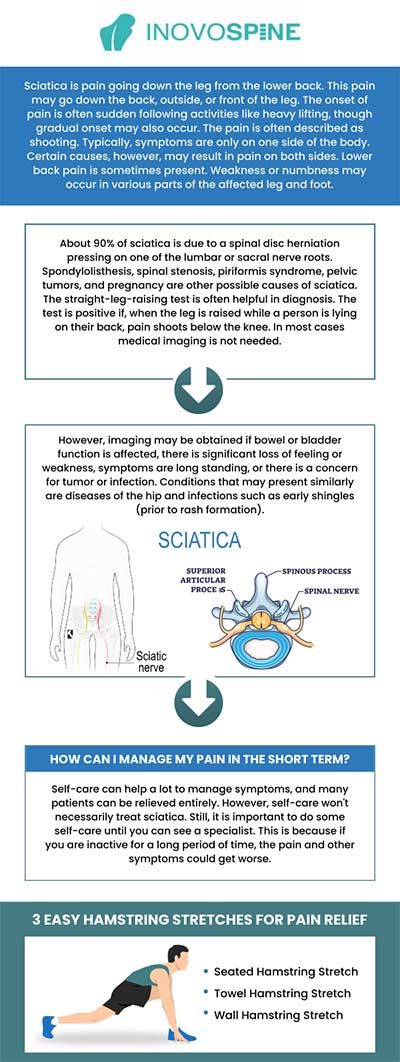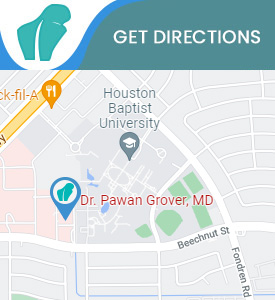When Should I Visit a Sciatica Pain Doctor in Houston, TX?
At InovoSpine, consult with our board-certified specialist, Dr. Pawan Grover, MDPA, if you have sudden, severe pain, weakness down your leg, numbness, difficulty lifting your foot, or unexplained loss of bladder and bowel movements. Furthermore, if your pain interferes with your regular activities, if it’s becoming worse over time, or if it’s moderate to severe and accompanied by tingling, numbness, or weakness in your muscles. For more information, contact us or book an online appointment. We serve patients from Houston, TX, and surrounding areas.


Table of Contents:
What is sciatica?
What are the symptoms of sciatica?
Can sciatica be cured permanently?
How can Dr. Pawan Grover determine when sciatica pain requires professional treatment?
The sciatic nerve has a significant role in motor function, sensory perception, and sensation in the lower extremities. When compressed or irritated, the signals that travel along its pathway become disrupted, leading to a range of symptoms. The most common symptom we encounter at our practice is pain that follows the course of the sciatic nerve, starting from the lower back, into the buttock, and down the leg. The intensity of this pain might vary from a little ache to a severe, agonizing feeling that intensifies with specific motions or postures.
Our patients may also experience lower back pain, hip pain, tingling or numbness in the leg or foot, difficulty moving the leg or foot, burning or shooting pain in the buttocks or leg, and constant pain on one side of the rear. These symptoms can vary from occasional discomforts to constant, debilitating pain.
The causes of sciatica are varied. The most common cause we’ve observed is a herniated disc in the lower spine, where the soft, central portion of an intervertebral disc pushes through its outer layer, pressing on the sciatic nerve root, causing irritation and pain. Other causes are degenerative disc disease, spondylolisthesis, piriformis syndrome, bone spurs on the spine, spinal stenosis, and tumors.
We believe it’s important to address sciatica as it can significantly impact an individual’s quality of life. If you’re experiencing symptoms of sciatica, we encourage you to seek our medical attention. While mild sciatica often goes away over time, more severe cases may require treatment such as physical therapy, medications, and, in some cases, surgery.
Sciatica can manifest a range of symptoms affecting the lower back, buttocks, and legs and primarily follows the distribution of the sciatic nerve.
Sciatica symptoms can vary in intensity, from a mild ache to a severe burning sensation. You may experience sharp, shooting pain that originates in your lower spine and radiates down one side of your leg, often worsened by prolonged sitting, coughing, sneezing, or sudden movements. Accompanying symptoms can include numbness or tingling in the leg or foot, weakness or difficulty moving the leg or foot, and a burning or prickling sensation in the foot or leg.
We recognize that sciatica can greatly affect your mobility and disrupt your daily life. If you’re dealing with severe or persistent symptoms, or if the pain has lasted longer than a week, we encourage you to seek medical attention. Similarly, if your symptoms have come on suddenly or are the result of a serious injury, immediate medical care is crucial.
While mild cases improve with rest, some cases need immediate medical attention.
If your sciatica pain persists or intensifies despite at-home remedies, or if you’re experiencing severe and sudden pain, it is crucial to consult our specialists. Prolonged or severe pain may indicate a more serious underlying condition that requires our prompt, specialized treatment to avoid long-term damage.
Symptoms of sciatica include:
● Numbness, tingling, or weakness in the legs, loss of sensation, muscle weakness, or numbness in the affected leg or foot can accompany sciatica pain. These neurological symptoms could be signs of nerve damage and require a medical evaluation.
● Incontinence or difficulty with bowel or bladder control necessitates immediate medical intervention. This can indicate nerve compression, or a condition known as cauda equina syndrome, which requires immediate surgery to prevent permanent damage.
● If your sciatica pain is accompanied by fever, chills, swelling, redness, or discharge, you should seek medical attention promptly. An underlying infection may be present and require specialized care.
● If your sciatica pain develops suddenly or worsens significantly, this warrants a medical evaluation. This may indicate a herniated disc or other acute condition.
● Gradual or increasing weakness in the legs is a concerning sign that requires prompt attention.
● If your sciatica pain makes it difficult to walk or stand for extended periods, seek medical advice from our specialists. Severe nerve compression may be the cause.
● Sciatica pain typically extends down the back of the leg, but if it reaches below the knee, it may indicate a more widespread nerve issue that requires evaluation.
● If your sciatica pain severely impacts your ability to work, sleep, or engage in daily activities, we at InovoSpine advise you to consult with our team.
We understand that while there’s no definitive cure for sciatica, there are various treatments that can alleviate its symptoms and improve the quality of life for our patients. Our primary goal is to reduce pain, improve mobility, and prevent further episodes of nerve damage. These conservative treatments often provide relief, improve strength and flexibility, and reduce the chance of recurring sciatica.
For severe cases where the pain persists despite conservative treatments or where sciatica is caused by a herniated disk or bone spur compressing the nerve, our expert team may recommend surgery. Our surgical procedures are designed to relieve the pressure on the sciatic nerve, which in turn helps to alleviate the pain. Our team of skilled professionals employs a holistic, patient-centered approach to diagnose and treat sciatica. We focus on identifying the underlying cause and extent of nerve compression to develop a personalized treatment plan that may include physical therapy, lifestyle modifications, medication, or, in more severe cases, minimally invasive surgery.
If you’re experiencing sciatica pain, you may wonder when it’s time to consult a specialist like Dr. Pawan Grover, MDPA, at InovoSpine in Houston, TX. Sciatica can vary from mild discomfort to severe pain, often affecting the lower back, buttocks, and legs. While some cases improve with rest and over-the-counter pain relief, certain signs indicate that you should seek professional help.
If your pain persists for more than a few days, worsens with movement, or begins to affect your daily life, it may be time to visit a sciatica pain doctor. Additionally, if you experience numbness, tingling, or weakness in your legs, or have trouble controlling your bowel or bladder, these are warning signs that require immediate medical attention. At InovoSpine, we are committed to helping you regain your mobility and live a life free from pain. Contact us today or book an appointment online to start your journey to a pain-free life. We serve patients from Houston TX, Hedwig Village TX, Meadows Place TX, Missouri City TX, Hunters Creek Village TX, Spring Valley Village TX, and surrounding areas.

Additional Service You May Need
- Regenerative Medicine
- Spinal Arthritis
- Diagnostic Mapping
- Interventional Pain
- Minimally Invasive
- Spine Pain
- Radiofrequency Ablation
- Spinal Cord Stimulation
- Physical Rehabilitation
- Facet Joint Pain
- Herniated Discs
- Muscle and Joint Pain
- Post-Laminectomy Pain
- Myofascial Pain
- Peripheral Nerve Pain
- Regional Pain Syndrome









